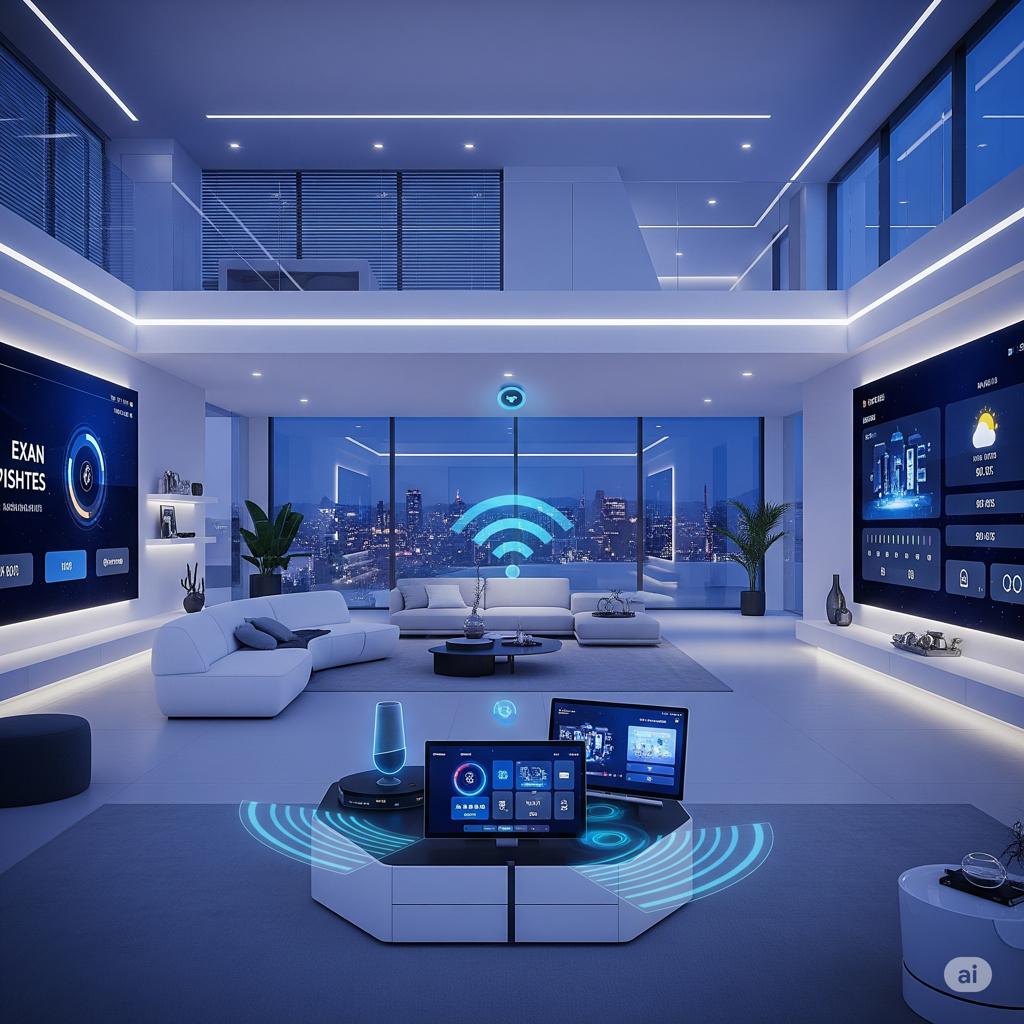
Smart Homes Are Here: Future Living, Now!
Wake up in a home that knows you better than you know yourself. A home that anticipates your every need and takes care of you when you're too busy to do what you do best. It's not science fiction, but today's promise, where smart technology has transformed our homes into intelligent ecosystems that learn the rhythm of our lives.
The silent revolution of networked appliances
The kitchen, the heart of the home, was the first to set the example in this era of digitalization. New smart appliances are not just gadgets, but real personal assistants that learn and adapt to our habits. There are washing machines that don't just wash clothes, but learn your habits, recommend the best programmes and remind you to add a particular item of clothing.
There are fridges that act as a real command centre for the home. Thanks to their integrated touchscreen, not only will your food stay fresh, but they will also help you plan meals, shop online and enjoy home entertainment in the form of music and multimedia content. It's basically a digital butler that never sleeps.
Then there are smart ovens, which take cooking to new levels of precision. Thanks to sensors and artificial intelligence inside the appliance, the ovens themselves understand what you are cooking and adjust the temperature and cooking time accordingly. They even let you know when your food is ready. It's technology at the service of the kitchen.
Invisible floor cleaners: robot floor cleaners and vacuum cleaners
If there's one thing that has freed women from the drudgery of sweeping the house every day, it's the latest range of robot vacuum cleaners. Object recognition and smart mapping allow this little digital assistant not only to sweep, but also to literally map the floor of your room, remember where there is still sweeping to be done and move around furniture with cat-like agility.
Others take this to the next level by integrating a vacuum cleaner and a mop into a single machine. Its multifunctional charging base not only recharges the robot, but also washes and dries the mop, fills the water tank and empties the dustbin. It's like having a robot housekeeper working around the clock while you relax with your friends over a cup of coffee.
The real magic of these products is not their ability to clean, but the fact that they give us back precious hours that we used to waste cleaning every day. Those precious hours we can now spend reading a book, practising yoga or simply sitting in silence.
Digital sentinels: Smart surveillance and protection systems
Smart technology has also revolutionised home security. Some of the latest security systems transform your home into a cyber-fortress with 24-hour security for your home and family.
Smart security cameras don't just capture video: they identify familiar faces, recognise people, animals and objects, and alert you with personalised messages. There are systems that can recognise an intruder the moment they enter your property and follow them wherever they go, keeping the subject of interest in focus at all times.
Smart carbon monoxide and smoke detectors don't just sound an alarm, they talk to you, letting you know what's happening and where. If there's smoke in the kitchen, they'll tell you where the problem is and give you a chance to react before the alarm goes off.
Smart flood sensors continuously monitor the water pressure in your home and detect even the smallest leak before it becomes an expensive repair. Imagine receiving a call on your smartphone while you're at work informing you that there's a potential leak in the bathroom and that you can call a plumber right away to prevent further damage.
The art of energy management: Smart thermostats and light bulbs
Energy saving is an economic and ethical reality for most households today. Smart thermostats are emblematic of this philosophy. They don't just regulate the temperature: they learn your habits, recognise when you're out and when you'll be back, and anticipate and preheat to save energy and provide comfort.
Others go a step further with in-home presence sensors that monitor the rooms you are in and only heat or cool those you are in. It's like having an energy butler that follows your movements, making real-time adjustments every time you move from one place to another.
Smart light bulbs have the ability to transform lighting from a functional necessity into an emotional experience. They can simulate natural sunrise to wake you up gradually, set the mood for a romantic meal or provide stimulating light for reading. With the ability to change the colour, brightness and warmth of the light via your smartphone or voice commands, you can imagine all kinds of creative possibilities.
For example, by installing a control system throughout your home, you will find that, thanks to automatic light adjustment and smart thermostats, you will save 30% on energy in the first year. This will allow you to pay for other home improvements, creating a virtuous circle of efficiency and happiness.
Critical analysis: Lights and shadows of the smart revolution
Like any technological revolution, smart homes have a number of pros and cons that need to be carefully considered.
The obvious advantages
The most practical and direct advantage is time savings. Smart technology can free up three to five hours of housework per week, hours that can be spent on entertainment. Energy efficiency translates into real money savings and a 20-30% reduction in bills each year.
Preventive security offers invaluable peace of mind, thanks to the ability to identify problems before they become costly emergencies.
But the most underrated yet fundamental aspect is ease of use for people who are less mobile or elderly: voice or smartphone control of lighting, heating and appliances has the power to transform the quality of domestic life.
Key considerations
The initial cost is still quite high. A complete system costs between £3,000 and £10,000, not including maintenance, updates and replacements over the years. The lifespan of a smart device is 5-7 years, much shorter than that of appliances, which last for decades.
Dependence on technology is new. Your entire household routine is disrupted when there is no internet or if a device breaks down. Consider that you cannot turn on the lights or heating because your router has crashed or the manufacturer's app is temporarily down.
The more devices you have, the harder it is to keep up with them. There is an app, an update and a password for every device. It is an absurd technological headache to manage multiple ecosystems that do not work well together.
The privacy and security puzzle
The issue of privacy on the internet is actually the most worrying problem in my opinion. These networked computing machines create information about our habits every second: where we move around the house, how we eat breakfast, when we go to bed, which parts of the house are most occupied. All of this information can be useful for making devices work better, but it also paints a very intimate picture of our habits.
Cyber security breaches are an increasingly real threat. Hacked thermostats, hacked cameras or compromised smart locks are no longer science fiction, but an everyday reality. The smart home is only as good as its weakest link, and consumers simply do not update the firmware on all their products or have sufficiently secure passwords.
Planned obsolescence and sustainability
A general concern, however, is the cost to the environment of constant technological obsolescence. Smartphones have a lifespan only slightly longer than that of old cars, and a constant and unlimited rate of replacement can produce huge volumes of electronic waste. The long-term sustainability of this phase of technology consumption is hardly guaranteed.
The learning curve and digital exclusion
For the less tech-savvy, the learning curve is daunting. Being forced to learn different applications, manage frequent updates and repair technical problems is bad enough. The promise of simplicity is a source of frustration. It becomes a source of digital divide within the family itself, where less technologically equipped members will struggle to be monitored from afar.
Dependence on manufacturers
Smart mode creates a huge dependence on developers. If a company withdraws support, does not provide updates or shuts down its servers, gadgets can become unusable. This contrasts with the life of a common household appliance, which could last a long time without maintenance provided by developers.
The bottom line
Smart home technology is the next logical step with real, tangible benefits, but it is also something to think carefully about. It can be very rewarding if you weigh the pros and cons, choose the solutions that best suit your needs and level of technological comfort, and always keep in mind that technology is meant to improve your life, not dominate it.
Key benefits: convenience, time and quality of life
Despite the challenges, the benefits of smart home assistance through technology are becoming a real and measurable part of everyday life. Consider waking up knowing that, as you get ready for the day, your robot vacuum cleaner starts cleaning around you without you having to lift a finger.
When you return, the floors are clean, and you can spend the time you would have spent cleaning relaxing with your loved ones or simply enjoying your hobby.
The convenience also extends to remote control: preheating the oven from the office, turning on the washing machine at noon, or checking that all the lights are off before you leave is a level of control that makes life easier.
24-hour surveillance of your home thanks to smart sensors gives you priceless peace of mind. Knowing that your home is safe from burglars, leaks or fires when you are on holiday or at work allows you to enjoy your holidays to the fullest with less anxiety.
Looking to the future: trends on the horizon
The most revolutionary innovation is coming to the smart home. Artificial intelligence is becoming increasingly intelligent, and the next generation of systems will be able to predict our needs with flawless accuracy. Imagine a home that monitors your restless sleep patterns and adjusts the lighting and heating to promote better sleep, or monitors signs of stress in your daily schedule and reverses them using a more relaxing environment.
Device consolidation is becoming increasingly integrated: your home will be able to communicate with your smartwatch so that it knows to automatically change the atmosphere when it detects that you are about to sleep, or your phone will be able to synchronise all your appliances when it detects that you are on your way home.
Environmental sustainability will be the catalyst for most of the innovations of the future. Energy management systems will not only become smarter, controlling usage within a building, but will also be integrated into smart grids and alternative power solutions. Your home of the future will not only consume less energy, but will also export it to the grid.
Real-life experience: Everyday transformation
You can see the change in attitude of people who initially did not believe in the use of smart technology and considered it a useless and expensive gadget that only the rich spent money on unnecessarily. Most often, people start with a beginner's smart thermostat that saves heat. The benefits are so obvious that other appliances are added, transforming the home into a haven of convenience and comfort where the most important things take priority: leisure activities and family.
For others, the busier ones, smart technology is literally a lifesaver. A vacuum cleaner that works for you while you do other things, a burglar alarm that keeps you in touch with your property even when you are away, water detectors that protect you from costly damage are not luxuries, but a real liberation from tedium.
The new era of home care
With smart technology, home care is no longer a chore. These are no longer just appliances, but a symphonic system that learns and evolves with our complicated and ever-changing lives.
The smart home is now like a silent orchestra in which all appliances play together in harmonious perfection, a symphony of convenience and energy efficiency. Robot cleaners move silently across the floor while smart thermostats maintain the desired temperature, security systems monitor everything behind the scenes, and networked appliances are choreographed to ensure maximum energy efficiency.
For today's career-oriented, child-rearing and ambitious women, this technology is not just progress: it is a gift of time, an emancipation from drudgery, an opportunity to channel their energies into what matters.
The smart home is not a phenomenon of the future: it is a phenomenon of the present that families are already experiencing. It is a concrete reality that, step by step, is reshaping the idea of how we love our homes. In this new reality, taking care of the home no longer means sacrificing precious time, but imagining technology with a vision to design homes that take care of us in exchange for what is most important to us.
Your new home awaits you, where it will not only be the place you live, but the smart companion that accompanies you every moment of your day, making every task efficient, every moment useful and every day full of promise.









